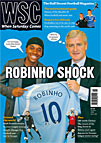 The Russian League plan to switch to playing through the winter, but James Appell wonders if anyone checked the weather forecast
The Russian League plan to switch to playing through the winter, but James Appell wonders if anyone checked the weather forecast
Russia in winter is not an especially pleasant place, even when you’re wearing a thick coat. It can’t be any better wearing football kit. But the Russian Football Premier League (RFPL) have in recent years been considering moving the season of the top two divisions from summer to winter, in keeping with the majority of Europe’s major championships. Russia’s footballers will have been phoning through orders for thermal underwear since July 29 when the RFPL officially unveiled the plan to switch to an autumn-spring season by 2012. “The most important of our goals is the move to an autumn-spring system,” RFPL president Sergey Pryadkin told the press. “It’s difficult to give a fixed time-frame at this moment, but we expect this to occur in an even-numbered year where there will be a break for the European Championship or World Cup. It’s possible that it will be 2012. This is the way forward from a commercial point of view.”